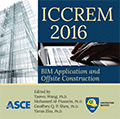International Conference on Construction and Real Estate Management 2016
A Framework for Developing an Engineering Management Theory Maturity Model
Publication: ICCREM 2016: BIM Application and Off-Site Construction
ABSTRACT
The engineering management is frequently faced with the huge challenge to build the body of theory. The initial solution to this challenge is exploring the regularity of engineering management development. Research nowadays is oriented towards technical problems; in this article, the development level of engineering management theory is presented which enables quality measurement of theory maturity development in the absence of theoretical system. Here, we develop a framework for developing engineering management theory maturity model. The objective is proposing the development stage of engineering management theory which finds the importance of scientific evolution and motivation of theory development. In this way, the results of research will have a greater influence on engineering management theory and draw the attention to significance of quantitative development motivated by model in field of engineering management.
Get full access to this chapter
View all available purchase options and get full access to this chapter.
ACKNOWLEDGEMENTS
This research was supported by the National Natural Science Foundation of China (NSFC) (grant No. 71390522).
REFERENCE
Bunge, M. (1967). Scientific research, vol. I & II, Springer Verlag, Berlin.
Campbell, N.R. (2013).Physics: the elements, Cambridge University Press, New York.
Crossby, P.B. (1980).Quality is free: the art of marking quality certain, Signet, New York.
Dewey, J. (2013). Logic-The theory of inquiry. Read Books Ltd., Paris.
Fayol, H. (1949). Industrial and general management, Pitman, London.
Hempel, C.G. and Oppenheim, P. (1948). “Studies in the logic of explanation.” Philosophy of Science, 15(2), 135-175.
Il’in, V.V.E., Kalinkin, A.T.E. and Syrovatkin, S.N. (1988). The nature of science: an epistemological analysis, Progress Publishers, Moscow.
Kuhn, T.S. (2012). The structure of scientific revolutions, University of Chicago Press, Chicago.
Lannes W.J. III, (2001). “What is engineering management?”IEEE Transactions on Engineering Management, 48(1), 107-115.
Levitt, R.E. (2007). “CEM research for the next 50 years: maximizing economic, environmental, and societal value of the built environment.” Journal of Construction Engineering and Management, 133(9), 619-628.
Lock, D. (1993). Handbook of engineering management, Butterworth-Heinemann, Oxford.
Morse, L.C. and Babcock, D.L. (2010). Managing engineering and technology: an introduction to management for engineers, Prentice Hall, Upper Saddle River.
Nagel, E. and Hawkins, D. (1961). “The structure of science.” American Journal of Physics, 29(10), 716-716.
Oswick, C., Fleming, P. and Hanlon, G. (2011). “From borrowing to blending: rethinking the processes of organizational theory building.” Academy of Management Review, 36(2), 318-337.
Phelps, A.F. and Horman, M.J. (2009). “Ethnographic theory-building research in construction.” Journal of Construction Engineering and Management, 136(1), 58-65.
Serna, E. (2015). “Maturity model of transdisciplinary knowledge management.” International Journal of Information Management, 35(6), 647-654.
Suppes, P. (1964). “What is a scientific theory?” Philosophy of Science Today, (1964), 55-67.
Sutton, R.I. and Staw, B.M. (1995). “What theory is not.” Administrative Science Quarterly, 4(3), 371-384.
Thamhain, H.J. (1992) Engineering management: Managing effectively in technology-based organizations, Wiley-Interscience, Mishawaka.
Vickers, P. (2014). “Scientific theory eliminativism.” Erkenntnis, 79(1), 111-126.
Wacker, J.G. (2004). “A theory of formal conceptual definitions: developing theory-building measurement instruments.” Journal of Operations Management, 22(6), 629-650.
Wacker, J.G. (2008). “A conceptual understanding of requirements for theory- building research: guidelines for scientific theory building.” Journal of Supply Chain Management, 44(3), 5-15.
Wang, Q.G. and Wang, M.J. (2012). “Thinking about frame of the Chinese engineering management theory system.” Science & Technology Progress and Policy, 29(18), 6-8.
Weick, K.E. (1989). “Theory construction as disciplined imagination.” Academy of Management Review, 14(4), 516-531.
Winston, A.W. (2004). “Engineering management-a personal perspective.” IEEE Transactions on Engineering Management, 51(4), 412-413.
Information & Authors
Information
Published In
ICCREM 2016: BIM Application and Off-Site Construction
Pages: 194 - 201
Editors: Yaowu Wang, Ph.D., Professor, Harbin Institute of Technology, Mohamed Al-Hussein, Ph.D., Professor, University of Alberta, Geoffrey Q. P. Shen, Ph.D., Professor, The Hong Kong Polytechnic University, and Yimin Zhu, Ph.D., Professor, Louisiana State University
ISBN (Online): 978-0-7844-8027-4
Copyright
© 2017 American Society of Civil Engineers.
History
Published online: Aug 14, 2017
Authors
Metrics & Citations
Metrics
Citations
Download citation
If you have the appropriate software installed, you can download article citation data to the citation manager of your choice. Simply select your manager software from the list below and click Download.
